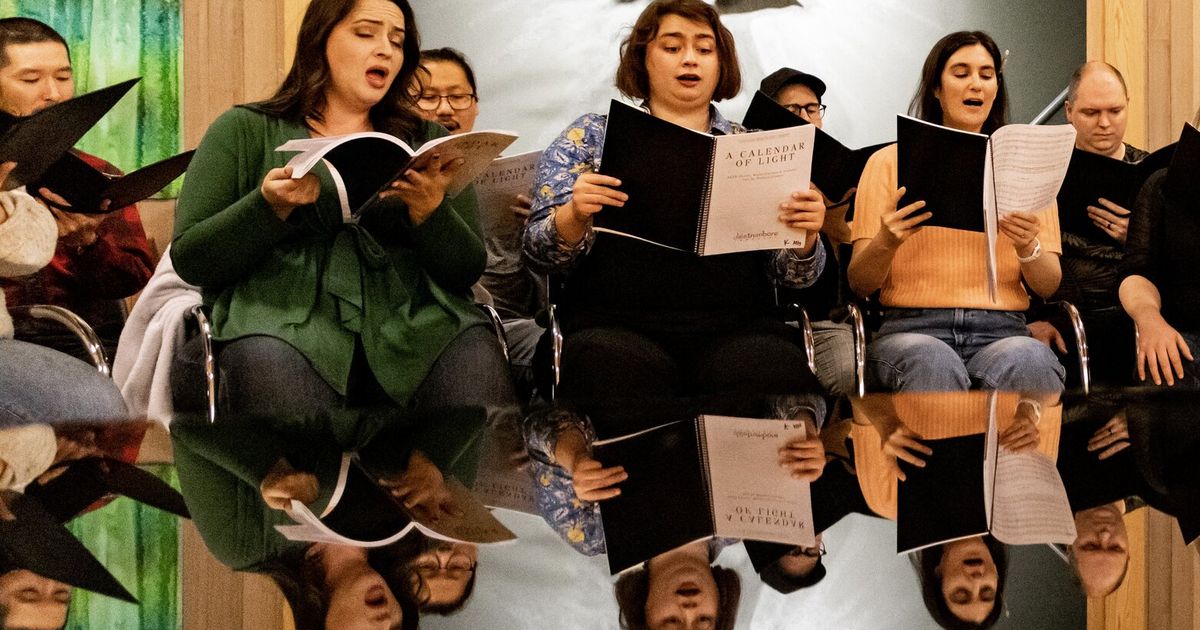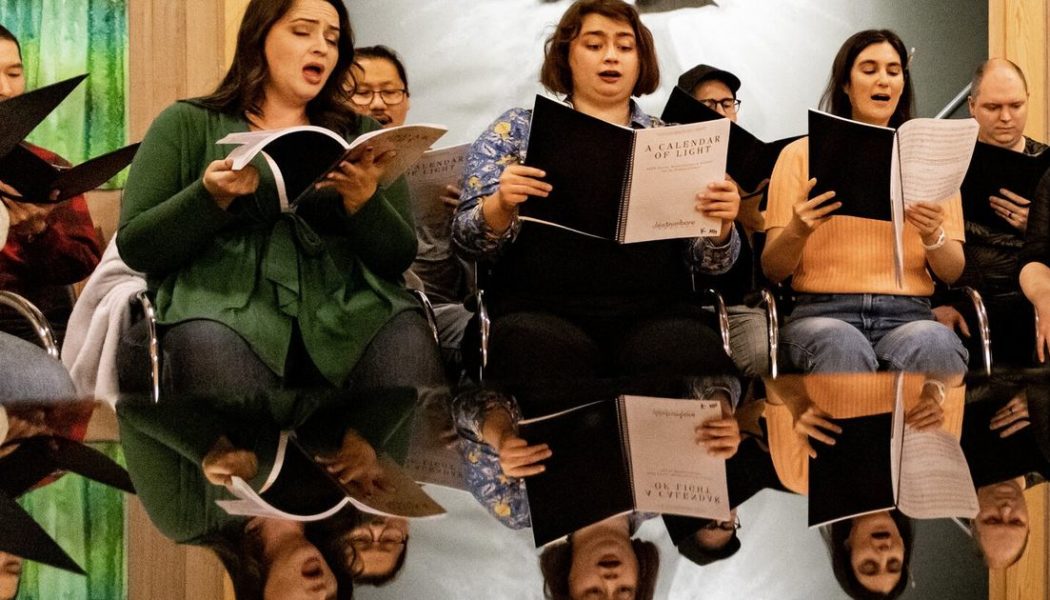
Having arrived early to a Queen Anne church to lead a rehearsal of a cappella choral group The Esoterics on a crisp November afternoon, founding director Eric Banks wraps up his latest text exchange with composer Dale Trumbore. They’ve been going over details of her new choral work, “A Calendar of Light,” which The Esoterics will premiere in just a little more than a month. Even though daylight saving time ended a couple days before — creating the brief illusion of an extra hour — he stays focused and has no temptation to slow down.
The experience of time is one of the themes of “A Calendar of Light,” which Banks commissioned from the Los Angeles-based Trumbore and chose as the grand finale of The Esoterics’ 30th-anniversary season. The performances will take place on Dec. 9 and 10 in Seattle and Tacoma, respectively.
“Dale is one of my favorite composers,” he says. “We’ve collaborated on several pieces over the past decade.”
That’s a powerful endorsement, especially when you realize that Banks, 54, has worked with hundreds of composers and is highly regarded for the breadth of his knowledge of contemporary music.
The Esoterics have established a unique reputation as a chamber choir devoted to the diversity of choral music being written today, commissioning close to 300 works in the three decades since Banks launched the ensemble. Their innovative programming has been recognized with five awards from Chorus America/American Society of Composers, Authors and Publishers, among other distinctions.
“I love doing new music from all around the world,” he says. “I want to do things that people haven’t heard before and give voice to composers who have been overlooked,” referring to women, people of color and LGBTQ+ artists.
Within the Puget Sound region, which is acclaimed for the variety of its choral ensembles, The Esoterics have carved out a niche all their own for introducing new voices. Other local groups cover an enormous spectrum of musical styles: The Byrd Ensemble, for example, is devoted mostly to early music, Opus 7 Vocal Ensemble specializes in 19th- to 21st-century a cappella choral music, and Seattle Pro Musica performs classics, sometimes with a full orchestral accompaniment, along with newly commissioned works.
“I’m fine with letting the other groups in town do famous composers or grand symphonic pieces or early music,” Banks says. “I’m just not interested in that — even though I love singing early music myself.”
A hunger for discovery
It was through singing in his church choir while growing up in a small town in New York’s Catskill Mountains that Banks initially fell in love with the choral medium. As a newbie in Seattle, he got to know a wide range of singers by participating in many of the choral groups then active. When he was earning advanced degrees in choral music at the University of Washington in the early 1990s, he invited some of them to perform in his graduate recitals.
They decided to continue collaborating, and Banks branded them The Esoterics because of their shared passion for digging into little-known and underrepresented a cappella repertoire. They performed for the general public for the first time in June 1993, offering a program of 20th-century composers in the auditorium of the new Seattle Art Museum downtown. Without the internet to publicize the debut, Banks recalls having the ensemble sing a set in the atrium of Cafe Flora in Madison Park to garner attention.
The SAM event was the first in what is by now a legacy of about 150 programs — or projects, as Banks prefers to call each new undertaking — presented in 520 performances around the Puget Sound and as part of competitions. Over the past decade, the norm has been four projects each season. Some of these have also been documented on their discography of 22 albums (with a recording of “A Calendar of Light” soon to be added).
From the first group of singers that Banks hand-picked back when it all started, The Esoterics grew to a roster of about 100 volunteer singers today, ranging in age from people in their 20s to their 70s. “I love singing in a community that champions new music and living composers,” says Shawna Avinger, who has been singing with the ensemble since 2006. “We like to joke that we are the ‘hard choir.’ We like a good challenge, musically.”
Each program has unique requirements for the number of singers: A total of 24 will perform “Calendar,” for example, complemented by an “ambient choir” of additional singers and audience members. Members of The Esoterics choose the projects in which they want to participate on the basis of their schedules — an attendance model that differs from how most choral groups operate.
Banks travels constantly to participate in conferences, judge competitions or present his own work as a composer. A lifelong love of languages — The Esoterics have sung in dozens — reinforces his hunger for discovering different styles and traditions across the globe.
“I’m always looking for new people to work with,” he says. “For composers who write music unlike what most people are writing.”
Coming back from the pandemic
The COVID pandemic hit the choral world especially hard. But The Esoterics played the strictures to their advantage. “We became more techno savvy and are much better at recording our own stuff now,” Banks says “We do more with social media and are about to do even more. And our audience has actually grown via livestreaming.”
Banks spent much of the pandemic in exile in Brazil, where he got caught in the travel ban while researching material for a new work about the Amazon. The enforced isolation inspired him to relive the fun of arranging pop music for an a cappella group he founded as a Yale undergraduate in the 1980s. His arrangement of Dua Lipa’s “Don’t Start Now,” for example, gave The Esoterics a fresh way to exercise their technique via Zoom and some heavy-duty editing.
Along with having to suspend several seasons, The Esoterics were forced to place their annual competition for new composers on hold. Known as Polyphonos and conducted since 2006, it had served as an important way to bring unknown composers onto their radar. Banks says they plan to resume the competition in a new form in 2024.
“We’ve discovered a lot of composers through Polyphonos before they made it big,” he says — including Trumbore, who was one of the three laureates in 2014.
Now a much sought-after composer acclaimed for her poetic choral scores, Trumbore recalls being struck by The Esoterics’ culture of innovation when she decided to enter the competition: “I could tell they approach things differently.” She praises the ensemble’s “wide range of stylistic variation” and “voracious appetite for stylistic differences.”
“An art of gentleness and nuance”
Lasting around 70 minutes, “A Calendar of Light” — an evening-length a cappella composition in 24 parts that sets poems by Barbara Crooker — is Trumbore’s most extensive composition to date. “It’s rewarding to find a collaborator that’s willing to take a chance on such a large piece — especially for a premiere,” she says.
More than a decade ago, Trumbore began collaborating with the poet on pieces that eventually became part of “Calendar.”
“Barbara captures everyday life and ordinary experience and lights it up with meaning and grace,” Trumbore said.
Trumbore crafted a libretto for “Calendar” by consulting with Crooker to select poems that trace “how our relationship to the changing seasons reflects our relationship to change itself.” The composer and poet will both be in attendance for the two concerts.
“I wanted an environmental piece. But I wanted it to be beautiful,” Banks says regarding his criteria for the commission. “And Dale was able to fit both of those bills.”
“‘Calendar’ approaches the idea of saving the planet by reminding us of the cycles of nature’s beauty,” according to Banks. “Not by the threat of environmental crisis. It is an art of gentleness and nuance, not of confrontation and polemics.”
“Is it impossible to plant change?” — a refrain running through the piece — is the question “A Calendar of Light” poses over and over and leaves with the audience, who are invited to add their voices in six of its movements. Banks remains optimistic that art can inspire change as he looks forward to guiding The Esoterics into their next decade. “We’re not going anywhere. We still have tons of music to do.”









